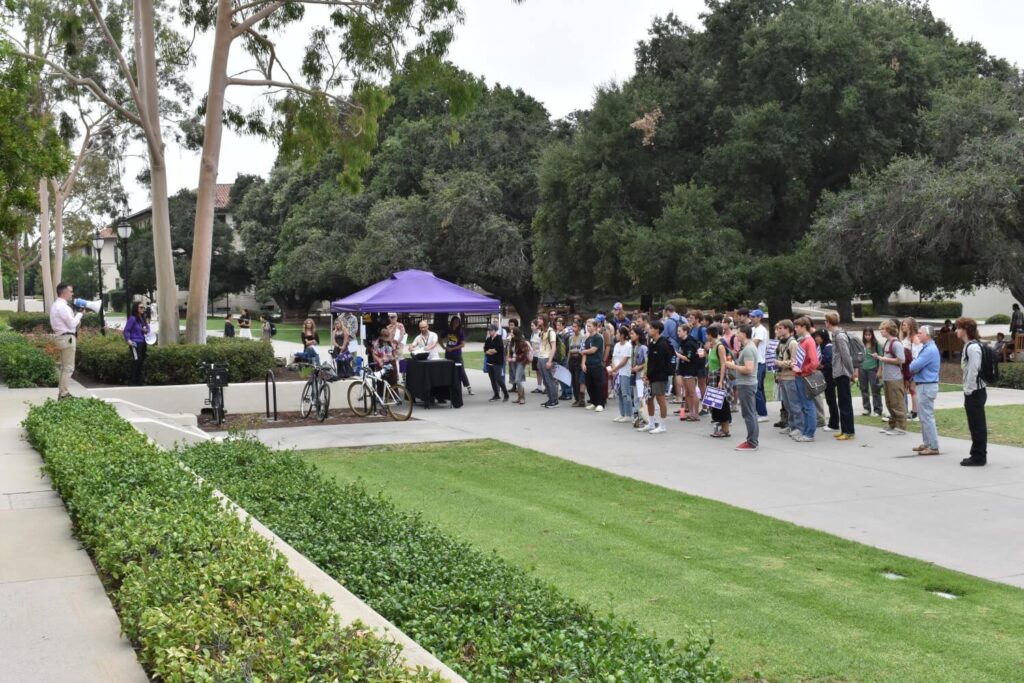Occidental’s non-tenured track (NTT) faculty union held a victory rally Sept. 22 in the Academic Quad celebrating gains they made in a new contract that took effect in August. But the victory remains uncertain, according to art history professor Sami Siegelbaum — who used a megaphone to tell a crowd of supportive students and faculty that the union’s demands are far from being met.
The new contract, which will expire in Summer 2026, raised wages for all 130 NTT faculty members and increased job security by allowing visiting professors to be reappointed beyond their five-year cap, according to Siegelbaum.

Siegelbaum said he, two other NTT faculty union members and a chief negotiator from the Service Employees International Union negotiated the new contract over the spring and summer with the college’s legal counsel and deans of the college.
According to Siegelbaum, the negotiations were emotional.
“Our argument was that we can’t make a living off this salary,” Siegelbaum said.
Siegelbaum said full-time NTT faculty will now make a minimum starting salary of $60,000 with annual increases of at least 3.75 percent. Full-time NTT resident and visiting professors will make a percentage of what their tenure colleagues make respectively, Siegelbaum said.
Dean Wendy Sternberg, who was at the bargaining table, told The Occidental over email that this compensation model allows NTT faculty to also benefit from salary increases of their tenure counterparts.
“The contract ensures compensation, benefits and job security for our faculty that meet or exceed that provided to non-tenure track faculty at comparable institutions,” Sternberg said in her statement.
Alec Arellano, a full-time visiting politics professor and member of the NTT faculty union, said everyone benefitted from the last round of negotiation.
“Everybody got more money, and I think that’s good,” Arellano said. “I’m aware of the fact that I have colleagues who struggle even more [than me] or really feel pinched, so I feel glad that everybody got raises.”
But Siegelbaum said there’s still work to be done.
Part-time faculty, who are paid per course taught, saw an increase from $8,000 per course to $8,150, according to Siegelbaum.
“Part-time faculty hardly saw any raise at all,” Siegelbaum said. “And they are the majority of NTT staff.”
Additionally, Siegelbaum said the union wants to create a pathway for NTT visiting professors to become NTT resident professors, who maintain greater job stability. Siegelbaum said he also wants the college to consider prioritizing NTT faculty for tenured positions at the college due to NTT faculty not being prioritized during searches for tenure-track professors in respective departments regardless of time spent at Occidental.
And with their current working conditions, NTT faculty are automatically placed at a disadvantage, Siegelbaum said.
While tenure positions attract highly accomplished professors outside of Occidental, it’s difficult for NTT faculty to advance any other type of scholarly endeavors that may make them competitive candidates for those tenure positions as they focus on teaching to pay their bills, Siegelbaum said.
Arellano said that the College provides internal funding opportunities for NTT faculty to conduct research during their time at Occidental, which is a gain brought about by previous union negotiations. According to Arellano, when he started teaching at Occidental in 2019, those opportunities didn’t exist.
However, for professors like Siegelbaum — who supports a five-year-old and a three-year-old with his partner, a freelance graphic designer — financially getting by in addition to supporting a family means sacrificing scholarly endeavors, conducting research and generally planning for the future, Siegelbaum said.
“You’re just teaching as much as possible to live,” Siegelbaum said.

The 2023-2024 school year marks Siegelbaum’s first year as a full-time professor, but he said he’s worked part-time at Occidental since 2018, picking up other teaching gigs at UCLA and Loyola Marymount University in their art history departments to support his family.
“It’s not enough to get by on even if you have several jobs at once,” Siegelbaum said.
With a life and a family established in Highland Park, Siegelbaum said switching careers and even leaving Occidental as a full-time NTT professor is a risk he doesn’t want to take.
“It’s hard to switch over to another industry when you’ve been narrowly focused on one career for 15 years,” Siegelbaum said.
Arellano said that his support of the NTT faculty union is not necessarily for himself, but rather for his colleagues as he said he is not representative of other faculty members.
“I’m childless, I choose to not own a car, I was able to graduate from college without a lot of debt and I know a lot of my colleagues, especially NTT faculty have, because of life circumstances, bigger challenges,” Arellano said.
Siegelbaum and Arellano both said in separate interviews that what’s kept them at Occidental is their love of teaching, their colleagues and their students. Siegelbaum said that if becoming tenured at Occidental was possible for him, he’d do it in a heartbeat.
“It’s something I think about literally every single day,” Siegelbaum said. “I wish I could make a career out of teaching here.”
Contact Mia Anzalone at anzalonem@oxy.edu.
![]()































